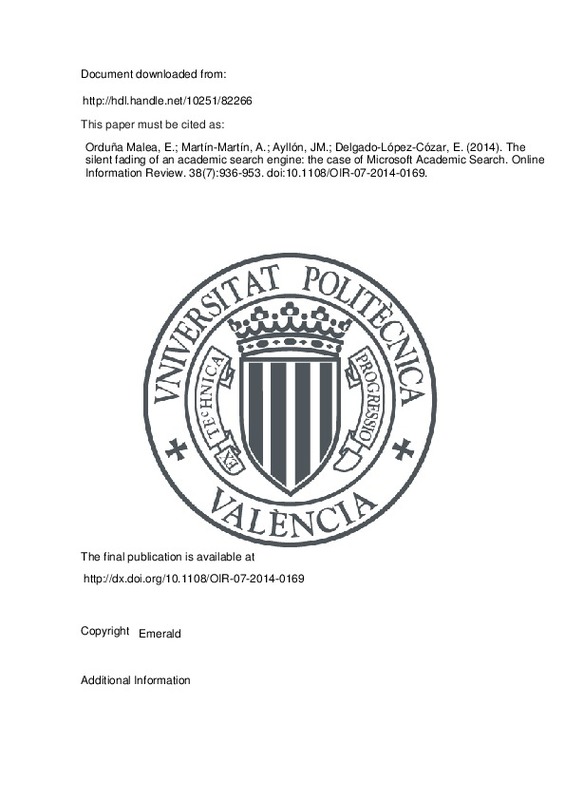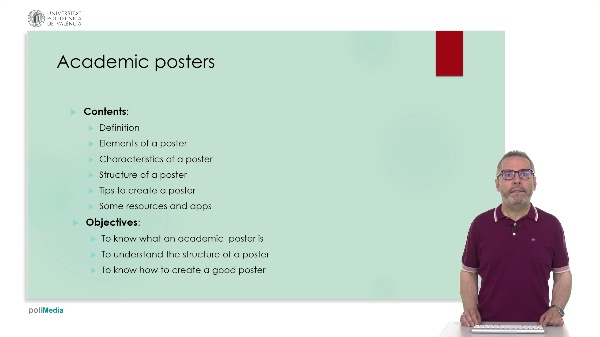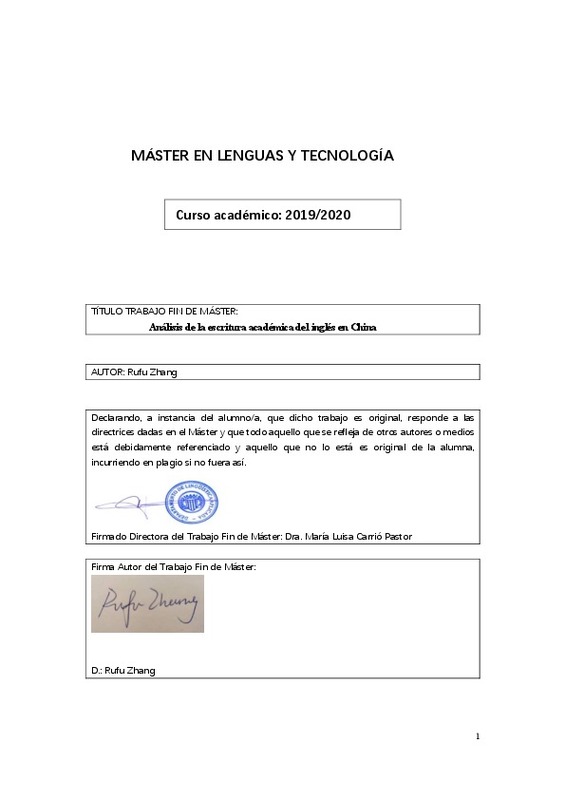JavaScript is disabled for your browser. Some features of this site may not work without it.
Buscar en RiuNet
Listar
Mi cuenta
Estadísticas
Ayuda RiuNet
Admin. UPV
The silent fading of an academic search engine: the case of Microsoft Academic Search
Mostrar el registro sencillo del ítem
Ficheros en el ítem
| dc.contributor.author | Orduña Malea, Enrique
|
es_ES |
| dc.contributor.author | Martín-Martín, Alberto
|
es_ES |
| dc.contributor.author | Ayllón, Juan M
|
es_ES |
| dc.contributor.author | Delgado-López-Cózar, Emilio
|
es_ES |
| dc.date.accessioned | 2017-06-02T12:15:13Z | |
| dc.date.available | 2017-06-02T12:15:13Z | |
| dc.date.issued | 2014 | |
| dc.identifier.issn | 1468-4527 | |
| dc.identifier.uri | http://hdl.handle.net/10251/82266 | |
| dc.description.abstract | Purpose - The purpose of this paper is to describe the obsolescence process of Microsoft Academic Search (MAS) as well as the effects of this decline in the coverage of disciplines and journals, and their influence in the representativeness of organizations. Design/methodology/approach - The total number of records and those belonging to the most reputable journals (1,762) and organizations (346) according to the Field Rating indicator in each of the 15 fields and 204 sub-fields of MAS, have been collected and statistically analysed in March 2014, by means of an automated querying process via http, covering academic publications from 1700 to present. Findings - MAS has no longer been updated since 2013, although this phenomenon began to be glimpsed in 2011, when its coverage plummeted. Throughout 2014, indexing of new records is still ongoing, but at a minimum rate, without following any apparent pattern. Research limitations/implications - There are also retrospective records being indexed at present. In this sense, this research provides a picture of what MAS offered during March 2014 being queried directly via http. Practical implications - The unnoticed obsolescence of MAS affects to the quality of the service offered to its users (both those who engage in scientific information seeking and also those who use it for quantitative purposes). Social implications - The predominance of Google Scholar (GS) as monopoly in the academic search engines market as well as the prevalence of an open construction model (GS) vs a closed model (MAS). Originality/value - A complete longitudinal analysis of disciplines, journals and organizations on MAS has been performed for the first time identifying an unnoticed obsolescence. Any public explanation or disclaimer note has been announced from the responsible company, something incomprehensible given its implications for the reliability and validity of bibliometric data provided on disciplines, journals, authors and congress as well as their fair representation on the academic search engine. | es_ES |
| dc.description.sponsorship | This research was funded under Project HAR2011-30383-C02-02 from Direccion General de Investigacion y Gestion del Plan Nacional de I+D+I (Ministry of Economy and Competitiveness) and Project APOSTD/2013/002 from the Regional Ministry of Education, Culture and Sport (Generalitat Valenciana) in Spain. | en_EN |
| dc.language | Inglés | es_ES |
| dc.publisher | Emerald | es_ES |
| dc.relation.ispartof | Online Information Review | es_ES |
| dc.rights | Reserva de todos los derechos | es_ES |
| dc.subject | Universities | es_ES |
| dc.subject | Google Scholar | es_ES |
| dc.subject | Academic journals | es_ES |
| dc.subject | Academic search engines | es_ES |
| dc.subject | Microsoft Academic Search | es_ES |
| dc.subject | Scientific fields | es_ES |
| dc.subject.classification | COMUNICACION AUDIOVISUAL Y PUBLICIDAD | es_ES |
| dc.subject.classification | BIBLIOTECONOMIA Y DOCUMENTACION | es_ES |
| dc.title | The silent fading of an academic search engine: the case of Microsoft Academic Search | es_ES |
| dc.type | Artículo | es_ES |
| dc.identifier.doi | 10.1108/OIR-07-2014-0169 | |
| dc.relation.projectID | info:eu-repo/grantAgreement/MICINN//HAR2011-30383-C02-02/ES/EVALUACION DE EDITORIALES Y LIBROS CIENTIFICOS ESPAÑOLES DE HUMANIDADES Y CIENCIAS SOCIALES A TRAVES DE ANALISIS DE CITAS Y DIFUSION EN BIBLIOTECAS (2000-2009)/ | es_ES |
| dc.relation.projectID | info:eu-repo/grantAgreement/GVA//APOSTD%2F2013%2F002/ES/APOSTD%2F2013%2F002/ | es_ES |
| dc.rights.accessRights | Abierto | es_ES |
| dc.contributor.affiliation | Universitat Politècnica de València. Instituto de Diseño para la Fabricación y Producción Automatizada - Institut de Disseny per a la Fabricació i Producció Automatitzada | es_ES |
| dc.description.bibliographicCitation | Orduña Malea, E.; Martín-Martín, A.; Ayllón, JM.; Delgado-López-Cózar, E. (2014). The silent fading of an academic search engine: the case of Microsoft Academic Search. Online Information Review. 38(7):936-953. https://doi.org/10.1108/OIR-07-2014-0169 | es_ES |
| dc.description.accrualMethod | S | es_ES |
| dc.relation.publisherversion | http://dx.doi.org/10.1108/OIR-07-2014-0169 | es_ES |
| dc.description.upvformatpinicio | 936 | es_ES |
| dc.description.upvformatpfin | 953 | es_ES |
| dc.type.version | info:eu-repo/semantics/publishedVersion | es_ES |
| dc.description.volume | 38 | es_ES |
| dc.description.issue | 7 | es_ES |
| dc.relation.senia | 278889 | es_ES |
| dc.contributor.funder | Ministerio de Ciencia e Innovación | es_ES |
| dc.contributor.funder | Generalitat Valenciana | es_ES |
| dc.description.references | Beel, J. , Gipp, B. and Wilde, E. (2010), “Academic search engine optimization (ASEO)”, Journal of Scholarly Publishing, Vol. 41 No. 2, pp. 176-190. | es_ES |
| dc.description.references | Butler, D. (2011), “Computing giants launch free science metrics: new Google and Microsoft services promise to democratize citation data”, Nature, Vol. 476 No. 7358, p. | es_ES |
| dc.description.references | Carlson, S. (2006), “Challenging Google, Microsoft unveils a search tool for scholarly articles”, Chronicle of Higher Education, Vol. 52 No. 33, p. | es_ES |
| dc.description.references | Delgado-López-Cózar, E., & Cabezas-Clavijo, Á. (2013). Ranking journals: could Google Scholar Metrics be an alternative to Journal Citation Reports and Scimago Journal Rank? Learned Publishing, 26(2), 101-113. doi:10.1087/20130206 | es_ES |
| dc.description.references | Delgado López-Cózar, E., Robinson-García, N., & Torres-Salinas, D. (2013). The Google scholar experiment: How to index false papers and manipulate bibliometric indicators. Journal of the Association for Information Science and Technology, 65(3), 446-454. doi:10.1002/asi.23056 | es_ES |
| dc.description.references | Haley, M. R. (2014). Ranking top economics and finance journals using Microsoft academic search versus Google scholar: How does the new publish or perish option compare? Journal of the Association for Information Science and Technology, 65(5), 1079-1084. doi:10.1002/asi.23080 | es_ES |
| dc.description.references | Haustein, S., Peters, I., Bar-Ilan, J., Priem, J., Shema, H., & Terliesner, J. (2014). Coverage and adoption of altmetrics sources in the bibliometric community. Scientometrics, 101(2), 1145-1163. doi:10.1007/s11192-013-1221-3 | es_ES |
| dc.description.references | Jacsó, P. (2005), “As we may search – comparison of major features of the Web of Science, Scopus, and Google Scholar”, Current Science, Vol. 89 No. 9, pp. 1537-1547. | es_ES |
| dc.description.references | Jacsó, P. (2008). Google Scholar revisited. Online Information Review, 32(1), 102-114. doi:10.1108/14684520810866010 | es_ES |
| dc.description.references | Jacsó, P. (2011). The pros and cons of Microsoft Academic Search from a bibliometric perspective. Online Information Review, 35(6), 983-997. doi:10.1108/14684521111210788 | es_ES |
| dc.description.references | Jacsó, P. (2012). Google Scholar Metrics for Publications. Online Information Review, 36(4), 604-619. doi:10.1108/14684521211254121 | es_ES |
| dc.description.references | Khabsa, M. and Giles, C.L. (2014), “The number of scholarly documents on the public web”, PloS One, Vol. 9 No. 5, p. | es_ES |
| dc.description.references | Labbé, C. (2010), “Ike Antkare one of the greatest stars in the scientific firmament”, ISSI Newsletter, Vol. 6 No. 1, pp. 48-52. | es_ES |
| dc.description.references | Orduña-Malea, E., & Delgado López-Cózar, E. (2013). Google Scholar Metrics evolution: an analysis according to languages. Scientometrics, 98(3), 2353-2367. doi:10.1007/s11192-013-1164-8 | es_ES |
| dc.description.references | Ortega, J. L. (2014). Influence of co-authorship networks in the research impact: Ego network analyses from Microsoft Academic Search. Journal of Informetrics, 8(3), 728-737. doi:10.1016/j.joi.2014.07.001 | es_ES |
| dc.description.references | Ortega, J. L., & Aguillo, I. F. (2013). Institutional and country collaboration in an online service of scientific profiles: Google Scholar Citations. Journal of Informetrics, 7(2), 394-403. doi:10.1016/j.joi.2012.12.007 | es_ES |
| dc.description.references | Ortega, J. L., & Aguillo, I. F. (2014). Microsoft academic search and Google scholar citations: Comparative analysis of author profiles. Journal of the Association for Information Science and Technology, 65(6), 1149-1156. doi:10.1002/asi.23036 | es_ES |
| dc.description.references | Van Noorden, R. (2014). Online collaboration: Scientists and the social network. Nature, 512(7513), 126-129. doi:10.1038/512126a | es_ES |







![[Cerrado]](/themes/UPV/images/candado.png)




